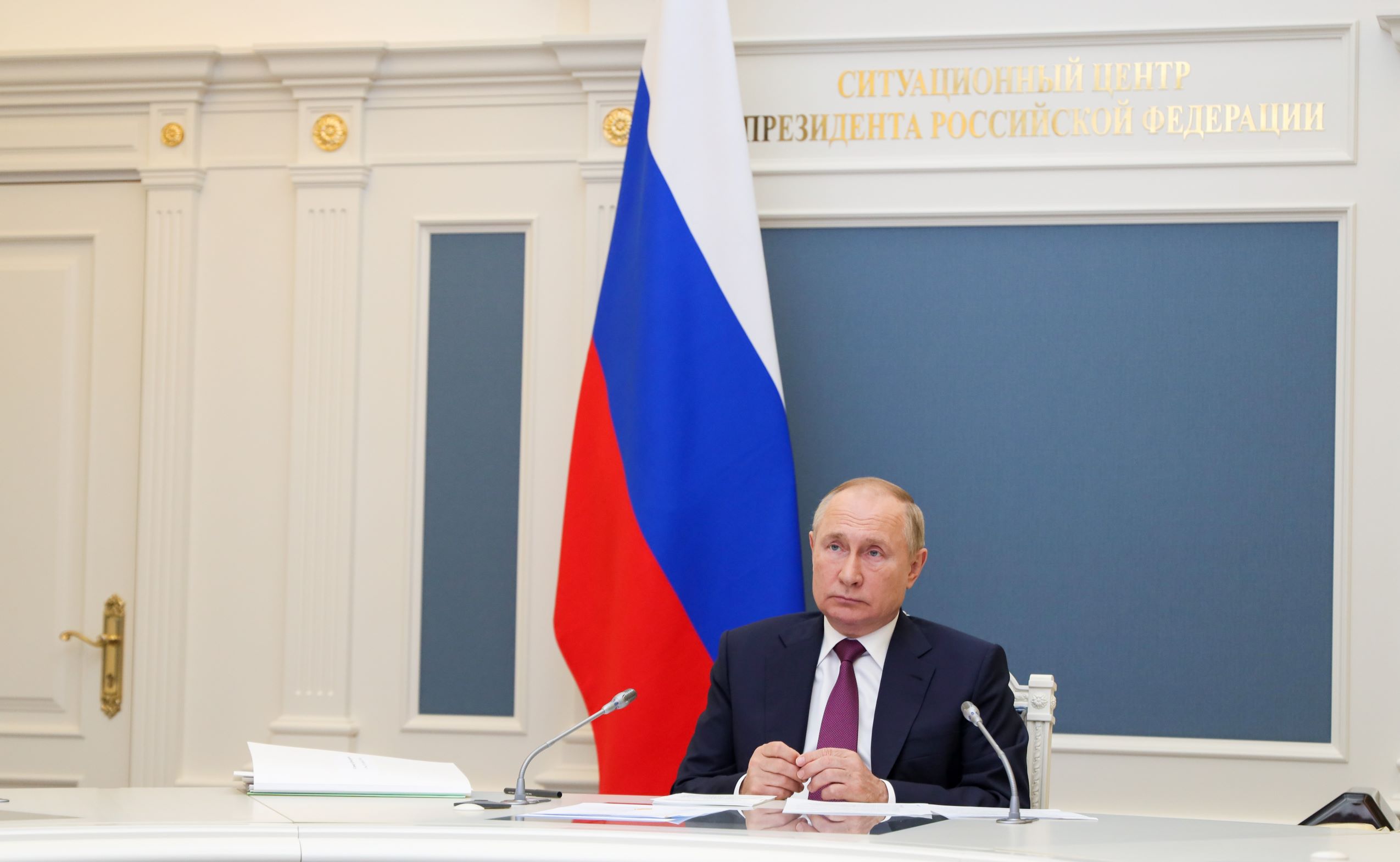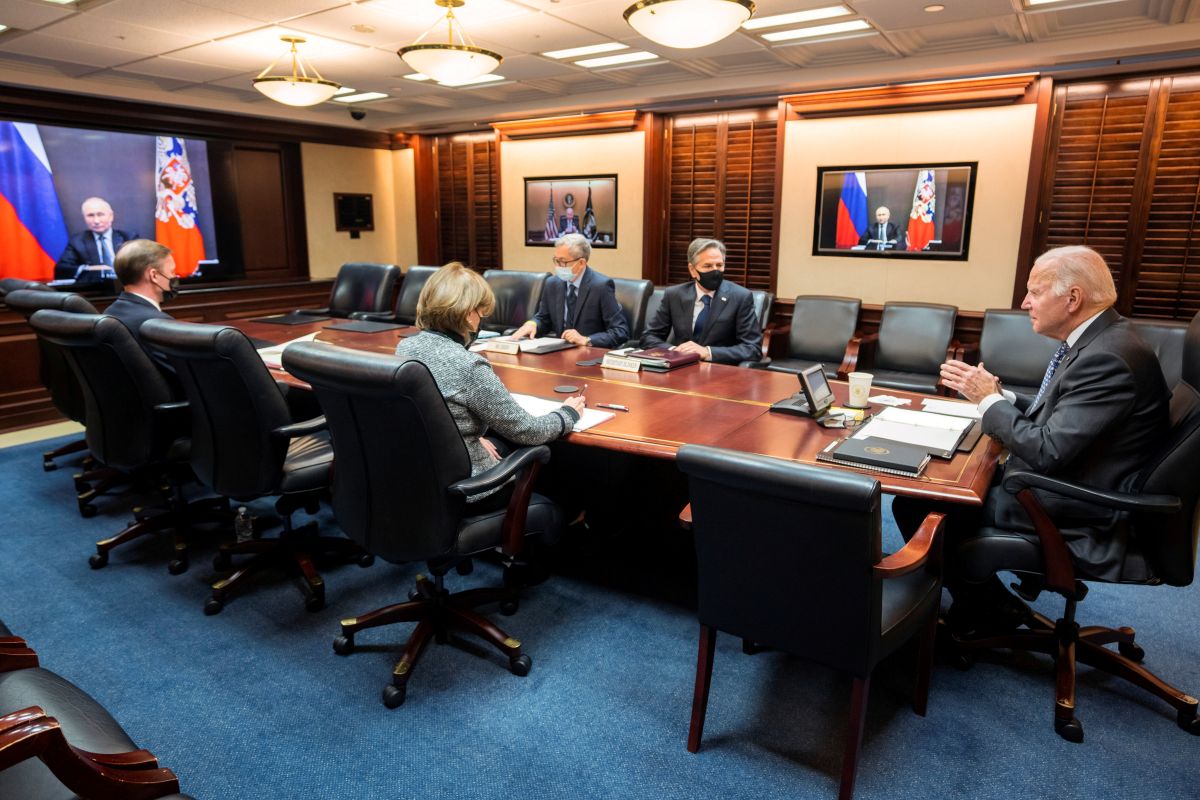Russia Demands Security Guarantees from the U.S. and NATO
On 10 December, the Russian Foreign Ministry issued a statement on the dialogue with the United States and other Western countries regarding security guarantees. The statement has an accusatory and provocative tone, and in it Russia makes a number of demands on the “collective West”. Poland can support the diplomatic efforts while also indicating that entering into negotiations with Russia on the terms it proposes would be detrimental to European security.
 Photo: Mikhail Metzel/TASS/Forum
Photo: Mikhail Metzel/TASS/Forum
Following the 7 December conversation between the Russian and U.S. presidents, Russia recognised that President Joe Biden might be willing to engage in dialogue on issues that Russia is particularly concerned about and has raised for several years. In the context of the ongoing concentration of Russian forces on the border with Ukraine, Russia has stated in its messaging that establishing a dialogue is a necessity, as relations between Russia and what it calls the “collective West”, had reached a critical point, which suggests the threat of escalation if the Russian offer is not taken up.
The Statement
Among Russia’s most important demands to the U.S. and other Western states identified in the statement is the adoption of an agreement in the form of an international legal agreement (treaty) that, if based on Russia's manipulated principle of equal and indivisible security, would give Russia long-term guarantees that would preclude further eastward enlargement of the North Atlantic Alliance. This would include the Alliance’s withdrawal from the 2008 Bucharest summit conclusions, which stated that Ukraine and Georgia would become NATO members. However, the Russian document ignores that enlargement can only take place if Ukraine and Georgia are ready and willing to do so.
Russia also proposes to conclude a series of agreements (legal and political) on the non-deployment by the U.S. and other NATO countries of unspecified strike weapon systems, which Russia sees as a threat, near Russia’s borders (which includes Alliance partner states). It also wants to limit military exercises in the area adjacent to NATO’s borders with Russia. In addition, NATO countries and Russia would have to agree on safe operating distances for their warships and aircraft in international air and sea space to prevent military incidents. In return, Russia is ready to resume a regular dialogue between the Russian and U.S. defence ministries and the full spectrum of Russia-NATO cooperation. The Russians want the military aspects of security discussed by the defence ministries along with the foreign ministries of Russia and NATO countries. Russia additionally offers the U.S. to join Russia’s unilateral moratorium on the deployment of land-based intermediate-range missiles previously banned by the INF (Treaty on Intermediate-range Nuclear Forces) and to agree and implement necessary measures to verify the fulfilment of mutual obligations in this regard.
Russia’s Goals
By making largely unrealistic demands, Russia wants to disrupt NATO’s activity, divide the allies (especially on NATO’s eastern enlargement), weaken their cooperation (primarily military with Ukraine), and, if possible, gain indirect influence on allied decision-making processes. This applies both to the Alliance’s “open door” policy (which includes increased cooperation with Ukraine and Georgia) and to decisions concerning its force posture (the structure of its forces, including the deployment of military units and the conduct of exercises in the countries of the Eastern Flank.
Russia’s strategic goal is to set up a political process that, in an optimal scenario, would allow it to launch a new conference dealing with European security. In those talks (e.g., involving Russia, the U.S., Germany, Italy, the UK, and France) Russia would seek to adopt a legally binding agreement. A similar attempt to shape a new security architecture was made in 2008 by then-President Dmitry Medvedev. Although the forum suggested by Russia would be the OSCE (e.g., as part of a “Helsinki 2.0” process), where voting is by consensus and Russia is able to block decisions by Western states, Russia is counting on concessions from the U.S. The concept of the indivisibility of security promoted by Russia is an attempt to impose an international order based on cooperation between superpowers (concert of superpowers), in which other states have, in practice, a limited right to conduct independent foreign and security policy.
Russia is aware that the acceptance of its demands in their entirety would entail a denial of the basic principles of the North Atlantic Alliance and as such is unlikely. However, the accusatory nature of the document, combined with the concentration of Russian troops on the borders with Ukraine, suggest that Russia wants to create the impression that the West’s failure to engage in a dialogue on its proposals will lead to the “pre-emptive” use of military force against Ukraine. The threat of war is intended to increase the willingness of Western partners to enter into a dialogue with Russia on issues that were regarded as the foundations of the post-1989 legal and political order in Europe (or may just serve to justify military action against Ukraine).
Conclusions
The Russian statement, which develops and details President Vladimir Putin’s demands to the West, should be regarded as another signal that Russia will not relent in its efforts to build a zone of privileged interests in the post-Soviet area and in Central and Eastern Europe, one that rules out the broader political and military involvement of the West, especially the U.S. in this region. Russia’s deliberately exorbitant demands are an attempt to blackmail the U.S. and NATO states into entering into a dialogue on the signalled issues. If so, it would legitimise Russia’s demand for the right to block decisions by other states on Euro-Atlantic security issues that it perceives as unfavourable (indivisibility of security concept). Russia has a double advantage in making these demands: if the U.S. and NATO agree to initiate such a dialogue, Russia will move closer to achieving its interests. Refusal will be used in Russian propaganda and may be used to justify military action against Ukraine.
While calling on the U.S. and NATO to enter into talks on security guarantees for itself, Russia does not, however, promise to withdraw its troops from the border with Ukraine, reduce the number of exercises, or limit the Russian military presence in its western strategic direction. Russia only offers a return to the NATO-Russia dialogue, while Russia itself has refused for over a year to hold a NATO-Russia Council meeting and in October this year suspended the activities of its representation to the NATO HQ in Brussels and the NATO facilities in Moscow.
NATO cannot accept most of the Russian demands. Nevertheless, possible signals of non-expansion of the Alliance, and in particular the issue of military support for Ukraine or limiting military activity on the Alliance’s Eastern Flank, could become a contentious issue within NATO. In particular, there may be proposals from allied groups to enter into a dialogue with Russia on these issues and to work out solutions that would potentially meet some of Russia’s demands while assumably limiting the risk of escalation. Some allies, including Germany, are also likely to continue to block military support—especially any increase—for Ukraine.
Poland could indicate that engaging in dialogue with Russia on the terms it has proposed would be extremely detrimental to European security, as it would divide Europe into zones of privileged interests for the superpowers. The desired response of the NATO countries to the Russian demands would be to call for the withdrawal of all Russian forces concentrated near Ukraine (including those deployed in early 2021). Assuming, however, that the U.S. and some Western NATO states may seek to initiate bilateral talks with Russia (or establish a different format for that purpose), Poland’s goal should be to avoid potentially dangerous divisions within the Alliance that affect NATO’s political cohesion and credibility. This can be achieved by proposing an internal discussion within NATO on a course of action and talks with Russia to, for example, avoid military incidents, renew the invitation to Russia to a NATO-Russia Council meeting, and indicating readiness to discuss the Russian proposals at the OSCE forum. The key issue, however, remains Ukraine, including the Russian-occupied Crimea.



_Easy-Resize.com.jpg)
